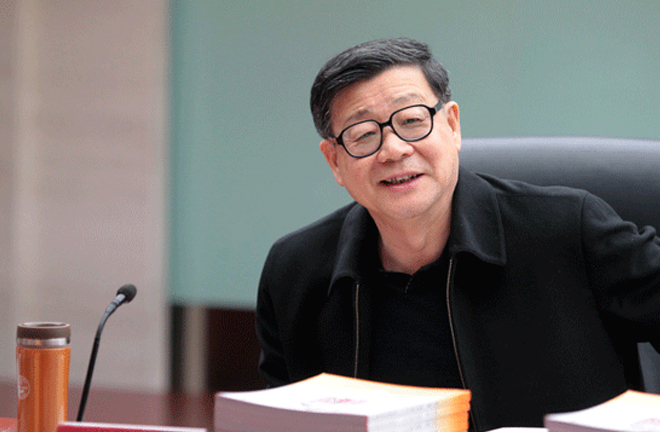Role of social sciences journal highlighted

Wang Weiguang, president of the Chinese Academy of Social Sciences and director of the editorial committee, delivers a speech at the Third Plenary Session of the Fourth Editorial Committee of Social Sciences in China in Beijing on Feb. 1.
On Feb. 1, the Third Plenary Session of the Fourth Editorial Committee of Social Sciences in China was held in Beijing.
Future tasks
In his address to the meeting, Wang Weiguang, president of the Chinese Academy of Social Sciences (CASS) and director of the editorial committee, said that Social Sciences in China has entered a golden age and great achievements were made last year. The journal has become a brand in the field of philosophy and social sciences, and it has successfully integrated old and new media, he added.
Wang listed priorities for the year. The top task is to equip editors with Marxist theories, he said. It is also important to take the initiative in agenda setting while focusing on Marxist political economics, think tank achievements, the governance ideas and strategies of President Xi Jinping, international financial risks and internal financial reforms, Chinese and Western philosophy, and literary criticisms written from Marxist perspectives.
Existing weakness
The meeting was hosted by Gao Xiang, secretary-general of CASS, editor-in-chief of Social Sciences in China Press (SSCP) under CASS and deputy director of the committee. Gao said Social Sciences in China strives to keep pace with the times and has played a leading role in promoting academic development in contemporary China. Last year, the journal published a series of articles commemorating the 70th anniversary of the victory in Chinese People’s Resistance against Japanese Aggression and the World Anti-Fascist War. It discussed the revival of Confucianism, democracy and science on the 100th anniversary of the New Culture Movement.
At the meeting, members of the editorial board made suggestions about the development of the journal. Zhang Shunhong, director of the Institute of World History at CASS, said domestic research on world history—financial history in particular—is insufficient. He suggested organizing seminars and forums to promote studies on this aspect. The study of financial history could offer solutions to the challenges the global economy currently faces, he said.
Gao Peiyong, director of the National Academy of Economic Strategy at CASS, suggested publishing articles studying the rules governing Chinese social sciences as well as those studying specific disciplines, such as economics and politics.
Development, influence
Over the past year, Social Sciences in China and Historical Research, another journal issued by SSCP, published a series of articles concerning key topics. The two journals have been listed into 2015 Top 100 Journals in Social Sciences and were awarded high marks in the evaluation of journals supported by the National Social Science Fund. In addition, SSCP created two new journals—Social Sciences in China Review and Chinese Literary Criticism—last year, which have received extensive attention and applause from academia.
By November last year, Social Sciences in China had received 7,421 contributions. Among them, 128 articles or 1.72 percent were published. Those published articles focused on seven major disciplines: Marxism, economics, law, sociology, philosophy, history and literature. In addition, there were five articles on public management, four on linguistics, three on international relations and three on politics. In general, the publication paralleled the academic development of China.
In the process of review and selection for Social Sciences in China, authors are treated equally regardless of their qualifications, backgrounds, status and titles in order to cultivate young academic talent and encourage new works. These authors are from foreign and domestic universities, as well as from elite and general universities. Nonetheless, some key universities and institutions, which had a higher quantity of published articles in previous years, have begun to publish fewer articles. By contrast, some general universities, which have increasing influence but rarely publish, have begun to make their mark.
In 2015, Social Sciences in China focused on issues of strategic, long-term and overall significance while paying attention to frontiers to promote academic development. A series of academic forums, including the Forum on the Frontiers of China’s Social Sciences, were held. Moreover, to boost communication and cooperation between academic journals, a series of forums on journal development, such as the National Top-Level Forum on Humanities and Social Sciences Journals, and the International Top-Level Forum on Renowned Chinese Academic Journals, were convened. This has contributed to the internationalization of Chinese academic journals.
Social Sciences in China is appealing and influential because it breeds ideas, talent and new books as well as new methodologies, said Zhou Suyuan, deputy director of the Institute of Modern History at CASS. “It is no exaggeration to say that the journal is of such high quality that it embodies the heights of Chinese social sciences,” he said.
